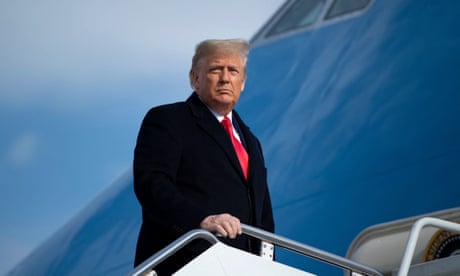- by foxnews
- 08 Apr 2025
Trump?s ?fact-free? approach caused briefing challenges, CIA report says
Trump’s ‘fact-free’ approach caused briefing challenges, CIA report says
- by theguardian
- 30 Nov 2021
- in news

Donald Trump's "fact-free" approach to the presidency created unprecedented challenges for intelligence officials responsible for briefing him, according to a newly released account from the CIA.
The 45th president's chaotic and freewheeling style, and his disinclination to read anything put in front of him, resulted in the presidential daily briefing, or PDB - a crucial security update including information about potential threats to the US - being delivered more regularly to Vice-President Mike Pence instead, the report states.
By the middle of Trump's term in office, his briefings were reduced to two weekly sessions of 45 minutes each. Briefings were discontinued altogether after the deadly insurrection of 6 January, which was sparked by Trump urging his supporters to march on the US Capitol in a failed attempt to overturn his defeat by Joe Biden.
The analysis comes in a 40-page unclassified update to the CIA's Getting to Know the President, a publication that chronicles efforts to brief presidents-elect through transition periods and into office for every administration since 1952.
"For the intelligence community (IC), the Trump transition was far and away the most difficult in its historical experience with briefing new presidents," the new chapter, posted to the CIA website, concludes.
"Trump was like [Richard] Nixon, suspicious and insecure about the intelligence process, but unlike Nixon in the way he reacted. Rather than shut the IC out, Trump engaged with it but attacked it publicly."
Nixon, who resigned in 1974 after the Watergate scandal, refused to accept any intelligence from the CIA and received briefings instead from trusted insiders such as his national security adviser and later secretary of state, Henry Kissinger.
Trump regularly assailed intelligence officials and famously chose to believe the Russian president, Vladimir Putin, over agencies including the CIA which concluded that Russia meddled in the 2016 election.
The CIA report's author, retired career intelligence officer John L Helgerson, said briefers achieved "only limited success" in their mission to deliver timely and relevant intelligence to Trump and to establish a working relationship with him.
Pence, by contrast, "was an assiduous, six-day-a-week reader" who made efforts to try to keep Trump focused. The vice-president urged briefers to "lean forward on maps" in graphics-heavy presentations much shorter than those presented to Trump's predecessors, and "would sometimes ask leading questions" during joint sessions with Trump "so the president would hear his concerns".
Pence's efforts were largely unsuccessful, Helgerson suggests. James Clapper, a former director of national intelligence, said Trump "was prone to fly off on tangents", according to the CIA report, and said "there might be [only] eight or nine minutes of real intelligence in an hour's discussion".
Helgerson writes: "Trump preferred that the briefer take the lead and summarise the key points and important items from the days since they had last had a session. The PDB was published every day, but because Trump received a briefing only two or three times a week, he relied on the briefer to orally summarize the significance of the most important issues."
Perhaps unsurprisingly, the subjects to which Trump paid most attention were China and developments involving Russia and Ukraine. The first of the former president's two impeachments was for pressing Ukraine to investigate Biden, then his likely 2020 election opponent. He was also investigated for allegedly colluding with Russia.
"A few subjects and areas of the world were notable by their relative absence," the CIA report states. "Regarding Europe, only Nato budget issues, Turkey and approaching elections in France and Germany stimulated much discussion. Latin America, Africa, and south-east Asia received almost no attention."
Overall, Helgerson believes, the briefing process barely survived Trump's presidency.
"[He] publicly criticised the outgoing directors of national intelligence and the CIA, and disparaged the substantive work and integrity of the intelligence agencies. From the outset, it was clear that the IC was in for a difficult time.
"The system worked, but it struggled."
- by foxnews
- descember 09, 2016
Ancient settlement reveals remains of 1,800-year-old dog, baffling experts: 'Preserved quite well'
Archaeologists have recently unearthed the remarkably well-preserved remains of a dog from ancient Rome, shedding light on the widespread practice of ritual sacrifice in antiquity.
read more


